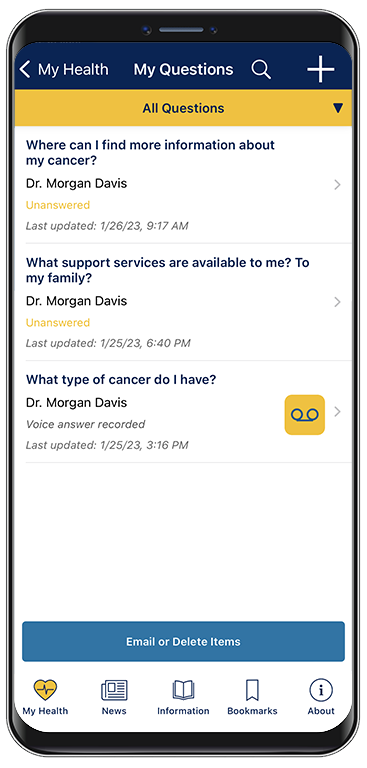ON THIS PAGE: You will find some questions to ask the doctor or other members of the health care team, to help you better understand your child’s diagnosis, treatment plan, and overall care. Use the menu to see other pages.
Talking often with the health care team is important to make informed decisions about your child’s health care. These suggested questions are a starting point to help you learn more about your child’s cancer care and treatment. You are also encouraged to ask additional questions that are important to you and your family. You may want to print this list and bring it to your child’s next appointment, or download Cancer.Net’s free mobile app for a digital list and other interactive tools to manage your child’s care. It may also be helpful to ask a family member or friend to come with you to appointments to help take notes.
Questions to ask after getting a diagnosis
-
What type of leukemia does my child have?
-
Can you explain my child’s pathology report (laboratory test results) to me?
-
Will more tests be needed to confirm the diagnosis?
-
What are the results of the analysis of the spinal fluid? What does this mean?
-
What are the results of the bone marrow aspiration? What does this mean?
-
What are the results of the cytogenetic studies done? What does this mean?
Questions to ask about choosing a treatment and managing side effects
-
What are the treatment options?
-
What is the goal of each treatment? Is it to eliminate the cancer, help my child feel better, or both?
-
What clinical trials are open to my child? Where are they located, and how do I find out more about them?
-
What treatment plan do you recommend? Why?
-
Who will be part of my child’s health care team, and what does each member do?
-
Who will be coordinating my child’s overall treatment?
-
What are the possible side effects of this treatment, both in the short term and the long term?
-
Could this treatment affect my child’s ability to become pregnant or have children in the future? If so, should I talk with a fertility specialist before treatment begins?
-
What can I do to protect my child from infection during and after treatment?
-
When should I call the doctor or hospital if there is a problem while at home with my child?
-
How will this treatment affect my child’s daily life? Will he or she be able to attend school and perform their usual activities?
-
If I’m worried about managing the costs related to my child’s cancer care, who can help me with these concerns?
-
What support services are available to my child? To my family?
-
If I have questions or problems, who should I call?
Questions to ask about planning follow-up care
-
What follow-up tests will my child need, and how often will he or she need them?
-
Are there blood tests or check-ups that can be done closer to home?
-
What long-term side effects or late effects are possible based on the treatment my child received?
-
What can be done to prevent or relieve the side effects?
-
How do I get a treatment summary and survivorship care plan to keep in my personal records?
-
What survivorship support services are available to my child? To my family?
-
Whom should I call for questions or problems?
The next section in this guide is Additional Resources. It offers some more resources on this website that may be helpful to you. Use the menu to choose a different section to read in this guide.

